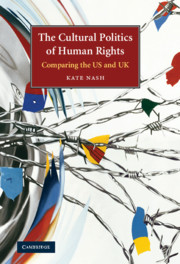Book contents
- Frontmatter
- Contents
- Preface
- List of acronyms used in the book
- Table of cases
- 1 What does it matter what human rights mean?
- 2 Analysing the intermestic human rights field
- 3 Sovereignty, pride and political life
- 4 Imagining a community without ‘enemies of all mankind’
- 5 Global solidarity: justice not charity
- 6 Conclusion
- References
- Index
- Frontmatter
- Contents
- Preface
- List of acronyms used in the book
- Table of cases
- 1 What does it matter what human rights mean?
- 2 Analysing the intermestic human rights field
- 3 Sovereignty, pride and political life
- 4 Imagining a community without ‘enemies of all mankind’
- 5 Global solidarity: justice not charity
- 6 Conclusion
- References
- Index
Summary
On paper there is, I think, not much to find wrong with the principles of human rights as they are listed in the Universal Declaration of Human Rights: every human being should be equally respected by every other, every human being should be free in their embodied integrity from state repression, and every human being should live in socio-economic, cultural and political conditions in which they might flourish. Nevertheless, human rights have many enemies, from across the political spectrum. Far from effecting the transformation of political questions into legal technicalities, human rights are one of main points at which passionate politics are engaged around topics of belonging and exclusion, equality and difference, freedom and constraint.
Human rights inspire antagonistic political perspectives because – as we shall see in this book – they are inherently paradoxical. In this study I try to be agnostic about the value of human rights, to refuse the blackmail of considering them either as a force for good, as intuitive moral principles which should be above politics, or as a force for evil, as fatally compromised by their association with adventures which actually turn them into their opposite. I try to untangle some of the paradoxes they create to consider what difference human rights are actually making in practice.
- Type
- Chapter
- Information
- The Cultural Politics of Human RightsComparing the US and UK, pp. vii - ixPublisher: Cambridge University PressPrint publication year: 2009



